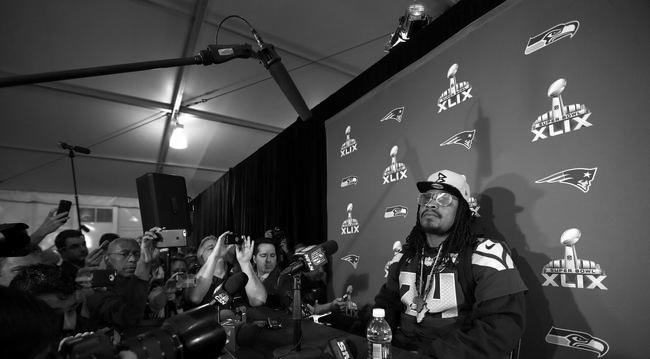In the movie Bull Durham, minor-league baseball veteran Crash Davis mentors young stud Ebby “Nuke” LaLoosh while he is developing into a superstar. At one point, Davis takes time to give LaLoosh advice about interviews. In this lesson, he gives LaLoosh a list of cliché sports sentences, telling him, “They’re your friends.”
Although this scene is meant to be humorous, it gives people an idea of what athletes think of the media. Crash teaches LaLoosh that the media can spin anything someone says, so it’s better to give them clichés to keep out of trouble.
As a student in pursuit of a career in sports journalism, it disappoints me to know that athletes think so negatively of reporters, but sometimes reporters do this.
At the tail-end of last NFL season, Philadelphia Eagles’ offensive lineman Lane Johnson stated that he was “done talking to the media for the year,” He later added, “Maybe the rest of my career.” This was Johnson’s reaction after receiving major backlash for comments made to the media following a game against the Oakland Raiders.
In a recent episode of Pardon My Take, a comedic sports podcast created by Barstool Sports, Johnson was asked what the media can do better as a whole. In his response, he mentioned that he would like to get his message across instead of having his words twisted. He would also like to “Have a human aspect to it instead of being so politically correct.”
I have to agree with Johnson on this. Professional athletes feel the need to hide their true selves when being interviewed due to fear of something being misinterpreted. Many athletes, including Johnson, have intriguing personalities which journalists could use to their advantages. Instead, reporters continue to receive interviews from seemingly half-dead people who don’t want to be asked questions.
A perfect example of this is current Oakland Raider, and former Buffalo Bill, Marshawn Lynch. Lynch has had some hilarious on-camera moments. However, he is most known for his relationship with the media.
In 2013, Lynch refused to talk to the media for the entire season. The next year, during a postgame interview, he answered nearly every question with the response, “Yeah.” From this, it is clear that he does not like to interact with the media.
In response to his interviews, reporters began to call Lynch immature and unprofessional. As one can assume, his desire to do postgame press conferences did not exactly skyrocket after those comments.
Lynch is considered the funniest guy in the NFL, according to GQ, so reporters have blown their shots when trying to receive a brilliant quote from the league’s comedian.
Another golden example is the infamous Allen Iverson “practice” press conference. The former NBA MVP, attempting to discuss the death of his best friend, was ridiculed by questions as to why he missed practice, which caused him to break.
The next day, Iverson was all over sports media, but they mentioned nothing about his friend. The only thing that mattered was his reaction to the questions.
Moments like these are the reasons athletes and journalists have bad blood. However, if the athletes are able to express themselves, they will give the reporters more information, which will provide for better stories.
Andrew Hayn is the opinions editor at The Bona Venture
His email is haynag15@bonaventure.edu
Photo courtesy of sandiegouniontribune.com






